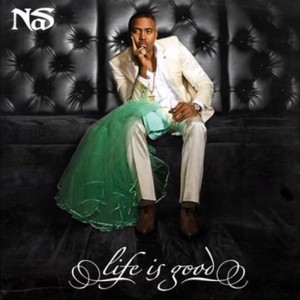 Some years ago, I thought the travesty that was Street’s Disciple marked the final nail in the coffin of Nas’s career. The guy’s albums have always been somewhat inconsistent, but that 2004 double album marked a new low in lyrical ugliness and uninspired production.
Some years ago, I thought the travesty that was Street’s Disciple marked the final nail in the coffin of Nas’s career. The guy’s albums have always been somewhat inconsistent, but that 2004 double album marked a new low in lyrical ugliness and uninspired production.
I guess once you hit the bottom, there’s only one way to go but up. Since signing with Def Jam, the Queens MC has tear, reinventing himself as a hip-hop’s elder statesman that can hang with the young bucks without looking desperate or selling his style out. He gets respect from the young’uns (and doesn’t embarrass himself when he collaborates with them,) but he has enough maturity (and grumpy “get off my lawn”-ness) to appeal to us old heads who are looking for more substance in our music.
His latest effort, Life Is Good, comes after a lengthy tease. He’s been dropping tracks for almost a year now, whetting his fans’ appetites for this album. The finished product does not disappoint at all. Continuing in the vein of 2006’s Hip-Hop Is Dead, Life Is Good is reflective and contemplative (although not particularly mournful) in parts, but Nas doesn’t let his emotions get in the way of his superior mic skills. Actually, I’d say that simply as a rhymesmith, Nas hasn’t sounded this good since his debut, Illmatic. His lyrical skills have always been dazzling, but at 38 years of age and after ten albums, it’s mighty impressive to hear a rapper sounding so hungry that his lyrics seem to be coming out in a torrent at times. It’s amazing how the man packs so many words into a line of music.
As just about every review of Life Is Good will tell you, parts of the album reference Nas’s divorce from R&B oddball Kelis (that’s her green wedding dress laying across his lap on the album cover,) and the rapper has admitted to being inspired by Marvin Gaye’s divorce-themed epic Here, My Dear. I don’t think there’s more than a very surface comparison between the two albums, and even if there was, it doesn’t even matter: Life succeeds on its’ own merits.
Nas jokingly dedicates album opener “Loco-Motive” (featuring an animated Large Professor) to his “trapped in the ’90s niggas,” but there’s a nostalgic element to Life Is Good that goes beyond that one song and stretches to some of the album’s best moments. “A Queens Story” is an excellent 4-minute autobiography, and you won’t be able to stop doing the Wop when Mary J. Blige appears to sing portions of New Edition’s “Once In A Lifetime Groove” on “Reach Out”-my pick for the album’s standout track. The hushed “Stay” is another highlight, while “Cherry Wine” unites Nas in bittersweet fashion with the late Amy Winehouse.
I don’t know whether it’s maturity or Def Jam’s budget, but the production on Nas’s latest few albums has been stellar. No I.D. and Salaam Remi helm the boards for most of Life Is Good, and the fact that their board work is uniformly hot is a big reason the album succeeds musically. Even the appearance by Rick Ross (on “Accident Murderers”) is fair. The only track that really stumbles is “Summer On Smash,” which suffers from a typically skeletal Swizz Beatz framework. Swizzy-we need more “Million Dollar Bill”s and less “Ruff Ryders Anthem”s these days, OK man?
Maybe the teens and early twenties folks won’t get Life Is Good, but I don’t think it was made for that crowd, anyway. As I mature into an “old head,” it’s nice to hear music that I can relate to that doesn’t sound like a relic. Nas continues to stay contemporary and cutting-edge while not dumbing down or appearing to be anything other than himself. He also deserves props for taking situations that would normally make for uneasy (or at least downbeat) listening (divorce, money problems, kid problems) and turning them into positive, fresh music. Life is good, indeed.
Grade: A-


2 comments
Trey Stone says:
Aug 10, 2012
solid album. it loses me with the middle trio of “Reach Out” through “Summer on Smash” but the back half in particular is pretty dang good, “The Don” excepted
i always feel like i have weird opinions about Nas compared to his big fans though cuz if i had to give a personal top three, in no particular order it’d be this one, “Hip Hop Is Dead” and…”I Am.”
blerd says:
Aug 10, 2012
“Reach Out,” to me is one of the best songs on the album. But it’s totally a nostalgic thing. I don’t think you’d “get it” if you weren’t in a particular place at a particular time.